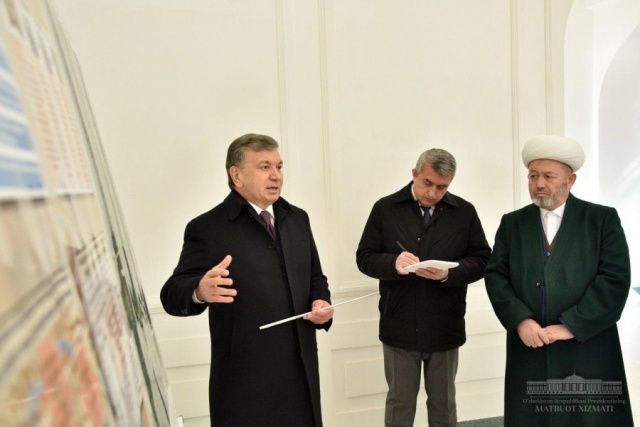Tashkent city



The President of Uzbekistan had visited this complex on March 10, 2017, gave appropriate instructions on its further improvement, creating necessary conditions for pilgrims.
The President inspected activities that have been implemented over the past period.
According to tradition, surahs from the Quran were read.
A consistent work is being carried out in accordance with the decree of President Shavkat Mirziyoyev on preparation for the 915th anniversary of Abdulhalik Gijduvani’s birth and the 700th anniversary of Bahauddin Naqshband’s birth of July 11, 2017. The Head of the state was provided with information on the “road map” of spiritual-enlightenment, scientific-practical events in connection with these anniversaries.


(4) Hadith 4 of the book of revelation by Sahih al-Bukhari
قَالَ ابْنُ شِهَابٍٍ: وَأَخْبَرَنِي أَبُو سَلَمَةَ بْنُ عَبْدِ الرَّحْمَنٍِ، أَنَّ جَابِرَ بْنَ عَبْدِ اللَّهِ الْأَنْصَارِيٍَّ، قَالَ وَهُوَ يُحَدِّثُ عَنْ فَتْرَةِ الْوَحْيِ، فَقَالَ فِي حَدِيثِهِ: بَيْنَا أَنَا أَمْشِي إِذْ سَمِعْتُ صَوْتًا مِنَ السَّمَاءِ فَرَفَعْتُ بَصَرِي، فَإِذَا الْمَلَكُ الَّذِي جَاءَنِي بِحِرَاءٍ جَالِسٌ عَلَى كُرْسِيٍّ بَيْنَ السَّمَاءِ وَالْأَرْضِ، فَرُعِبْتُ مِنْهُ فَرَجَعْتُ، فَقُلْتُ: زَمِّلُونِي، فَأَنْزَلَ اللَّهُ تَعَالَى: "يَأَيُّهَا الْمُدَّثِّرُ 1 قُمْ فَأَنْذِرْ 2 "سورة المدثر آية 1-2، فَحَمِيَ الْوَحْيُ وَتَتَابَعَ، تَابَعَهُ عَبْدُ اللَّهِ بْنُ يُوسُفٍَ، وَأَبُو صَالِحٍٍ، وَتَابَعَهُ هِلَالُ بْنُ رَدَّادٍٍ، عَنِ الزُّهْرِيٍِّ، وَقَالَ يُونُسٍُ، وَمَعْمَرٌٍبَوَادِرُهُ.
Sahih hadith: Narrated Jabir bin 'Abdullah Al-Ansari while talking about the period of pause in revelation reporting the speech of the Prophet While I was walking, all of a sudden I heard a voice from the sky. I looked up and saw the same angel who had visited me at the cave of Hira' sitting on a chair between the sky and the earth. I got afraid of him and came back home and said, 'Wrap me (in blankets).' And then Allah revealed the following Holy Verses (of Quran): 'O you (i.e. Muhammad)! wrapped up in garments!' Arise and warn (the people against Allah's Punishment),... up to 'and desert the idols.' (74.1-5) After this the revelation started coming strongly, frequently and regularly.
Reference: Sahih al-Bukhari 1: Chapter 1, Hadith 4.